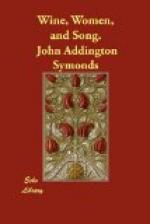No one on the road should
walk
’Gainst
the wind—’tis madness;
Nor in poverty shall stalk
With a face of
sadness;
Let him bear him bravely then,
Hope sustain his
spirit;
After heavy trials men
Better luck inherit!
While throughout the world
you rove,
Thus uphold your
banners;
Give these reasons why you
prove
Hearts of men
and manners:
“To reprove the reprobate,
Probity approving,
Improbate from approbate
To remove, I’m
moving.”
The next song is a lament for the decay of the Order and the suppression of its privileges. It was written, to all appearances, at a later date, and is inferior in style. The Goliardi had already, we learn from it, exchanged poverty for luxury. Instead of tramping on the hard hoof, they moved with a retinue of mounted servants. We seem to trace in the lament a change from habits of simple vagabondage to professional dependence, as minstrels and secretaries, upon men of rank in Church and State, which came over the Goliardic class. This poem, it may be mentioned, does not occur in the Carmina Burana, nor is it included among those which bear the name of Walter Mapes or Map.
ON THE DECAY OF THE ORDER.
No. 2.
Once (it was in days of yore)
This our order
flourished;
Popes, whom Cardinals adore,
It with honours
nourished;
Licences desirable
They gave, nought
desiring;
While our prayers, the beads
we tell,
Served us for
our hiring.
Now this order (so time runs)
Is made tributary;
With the ruck of Adam’s
sons
We must draw and
carry;
Ground by common serfdom down,
By our debts confounded,
Debts to market-place and
town
With the Jews
compounded.
Once (’twas when the
simple state
Of our order lasted)
All men praised us, no man’s
hate
Harried us or
wasted;
Rates and taxes on our crew
There was none
to levy;
But the sect, douce men and
true,
Served God in
a bevy.
Now some envious folks, who
spy
Sumptuous equipages,
Horses, litters passing by,
And a host of
pages,
Say, “Unless their purses
were
Quite with wealth
o’erflowing,
They could never thus, I swear,
Round about be
going!”
Such men do not think nor
own
How with toil
we bend us,
Not to feed ourselves alone,
But the folk who
tend us:
On all comers, all who come,
We our substance
lavish,
Therefore ’tis a trifling
sum
For ourselves
we ravish.
On this subject, at this time,
What we’ve
said suffices:
Let us leave it, lead the
rhyme
Back to our devices:
We the miseries of this life
Bear with cheerful
spirit,
That Heaven’s bounty
after strife
We may duly merit.




